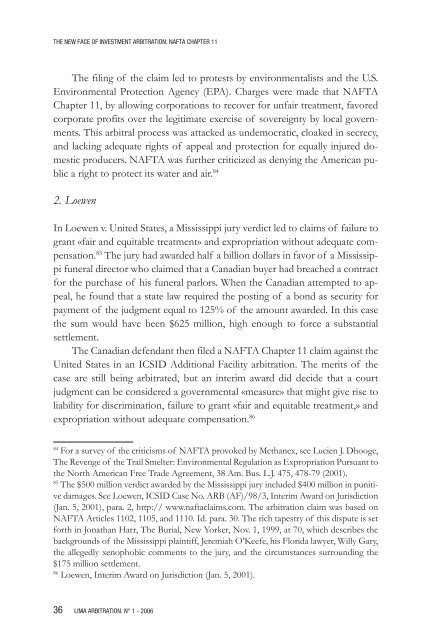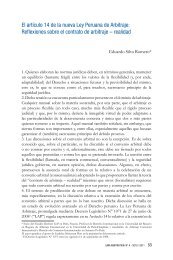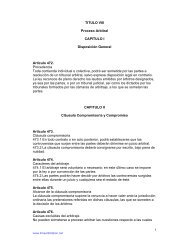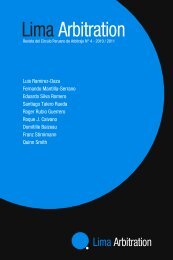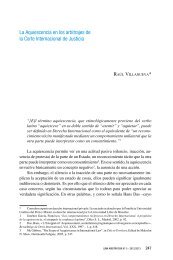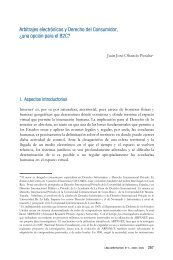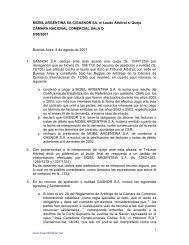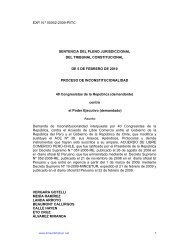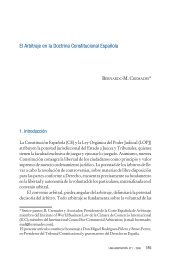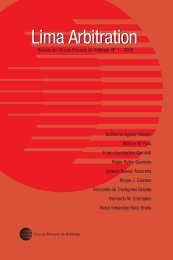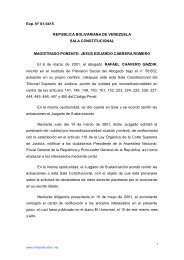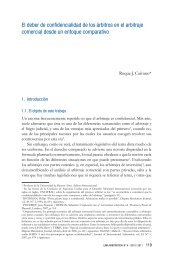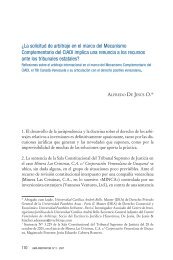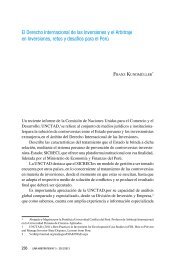Lima Arbitration
Lima Arbitration
Lima Arbitration
Create successful ePaper yourself
Turn your PDF publications into a flip-book with our unique Google optimized e-Paper software.
THE NEW FACE OF INVESTMENT ARBITRATION: NAFTA CHAPTER 11<br />
The filing of the claim led to protests by environmentalists and the U.S.<br />
Environmental Protection Agency (EPA). Charges were made that NAFTA<br />
Chapter 11, by allowing corporations to recover for unfair treatment, favored<br />
corporate profits over the legitimate exercise of sovereignty by local governments.<br />
This arbitral process was attacked as undemocratic, cloaked in secrecy,<br />
and lacking adequate rights of appeal and protection for equally injured domestic<br />
producers. NAFTA was further criticized as denying the American public<br />
a right to protect its water and air. 84<br />
2. Loewen<br />
In Loewen v. United States, a Mississippi jury verdict led to claims of failure to<br />
grant «fair and equitable treatment» and expropriation without adequate compensation.<br />
85 The jury had awarded half a billion dollars in favor of a Mississippi<br />
funeral director who claimed that a Canadian buyer had breached a contract<br />
for the purchase of his funeral parlors. When the Canadian attempted to appeal,<br />
he found that a state law required the posting of a bond as security for<br />
payment of the judgment equal to 125% of the amount awarded. In this case<br />
the sum would have been $625 million, high enough to force a substantial<br />
settlement.<br />
The Canadian defendant then filed a NAFTA Chapter 11 claim against the<br />
United States in an ICSID Additional Facility arbitration. The merits of the<br />
case are still being arbitrated, but an interim award did decide that a court<br />
judgment can be considered a governmental «measure» that might give rise to<br />
liability for discrimination, failure to grant «fair and equitable treatment,» and<br />
expropriation without adequate compensation. 86<br />
84<br />
For a survey of the criticisms of NAFTA provoked by Methanex, see Lucien J. Dhooge,<br />
The Revenge of the Trail Smelter: Environmental Regulation as Expropriation Pursuant to<br />
the North American Free Trade Agreement, 38 Am. Bus. L.J. 475, 478-79 (2001).<br />
85<br />
The $500 million verdict awarded by the Mississippi jury included $400 million in punitive<br />
damages. See Loewen, ICSID Case No. ARB (AF)/98/3, Interim Award on Jurisdiction<br />
(Jan. 5, 2001), para. 2, http:// www.naftaclaims.com. The arbitration claim was based on<br />
NAFTA Articles 1102, 1105, and 1110. Id. para. 30. The rich tapestry of this dispute is set<br />
forth in Jonathan Harr, The Burial, New Yorker, Nov. 1, 1999, at 70, which describes the<br />
backgrounds of the Mississippi plaintiff, Jeremiah O’Keefe, his Florida lawyer, Willy Gary,<br />
the allegedly xenophobic comments to the jury, and the circumstances surrounding the<br />
$175 million settlement.<br />
86<br />
Loewen, Interim Award on Jurisdiction (Jan. 5, 2001).<br />
36 LIMA ARBITRATION. N° 1 - 2006


